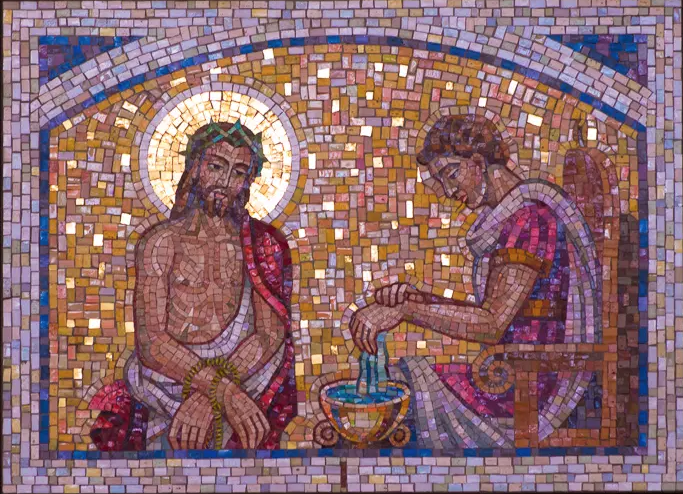![]()
One of the most iconic scenes in the crucifixion narrative is the Roman prefect Pontius Pilate washing his hands at Jesus’ trial before a multitude of people. In Matthew 27:24, Pilate declared innocence in front of Rome and the Jewish mob present at the display. Some Christians may wonder whether Pilate was truly innocent—by the standards of his day and of ours. Pilate held the power (John 19:10), but he remanded the decision to his Jewish citizenry (Matthew 27:25). In other words, should Christians believe Pilate is innocent?
According to his Independent Press article, David Keys reported both Christians and pagans agreed about Pilate’s innocence in the trial. This was to “portray themselves as pro-Roman” in order to convince Roman elites of their religious authority. Keys estimated that at the time 10% of the Roman empire practiced Christians, while 90% were pagans.
In the centuries following the death and resurrection of Christ, the Christian faith was viewed as a dissention from Roman authority. The Apostles and subsequent Christian converts faced ultimate terrors and persecution for their faith in Christ. The aura of death remained almost incessantly until the miraculous victories of the emperor Constantine in the early fourth century A.D.
Whether or not his vision of “By [the Cross of Christ], you shall conquer” is true, Constantine rose to power, thus allowing Christians to practice their faith across the empire. However, an American historian of early Christianity, David Lloyd Dusenbury of the Hebrew University of Jerusalem, described “the scale and nature of the propaganda battles that raged” from both parties to obtain control of the empire.
In his book “The Innocence of Pontius Pilate: How the Roman Trial of Jesus Shaped History,” Dusenbury wrote about the different perspectives of Pilate and the theo-political wars with archaeologic evidence of such battles.
His research suggested that the pagans sought to exonerate Pilate by claiming that Jesus “was a violent and dangerous rebel,” which justified Pilate’s crucifixion sentence. Meanwhile, Christian propagandists exonerated Pilate by claiming the Jewish citizens influenced the decision (John 19:11; Acts 2:23), which puts the blame on them for his death (Matthew 27:25).
Whether or not Pilate is innocent, modern believers must understand the culture behind Pilate’s ceremonial washing. Pilate allowed the people to decide Jesus’ fate – inasmuch as anyone could fate God – clearing himself of responsibility. Therefore, he was not legally guilty of killing Christ. Yet, Pilate is still guilty of sin for killing Christ by proxy.
In his letters to the Romans, the apostle Paul wrote, “For all have sinned and fallen short of the glory of God,” (Romans 3:23).
Christians had believed Pilate to be innocent, but there is new reason to believe this truth furthered the Christian-pagan tension. However, several theological questions remain unanswered from this revelation.
Firstly, were Christians’ fighting for dominance proof of Christianity’s holiness against the evil pagan world, or was Christianity losing touch with its “love thy neighbor” core beliefs (Matthew 22:39; Mark 12:31; Leviticus 19:18)?
Secondly, why would Christ remain silent to Pilate’s question of the truth? Pilate tried to legally set Christ free by His words (John 19:10-12). Obviously, God didn’t intervene for Christ’s resurrection and salvation (Romans 8:34), but why would Christ not help Pilate understand?
Thirdly, while Christians believe Christ is God, the article noted that non-Christians believed him to be a violent rebel. Why did the Jews not kill Christ themselves as both a theological “purification” and a political favor to Rome?
Lastly, did Pilate try to justify himself by giving Joseph of Arimathea Christ’s body (Mark 15:43-45)? Was Pilate trying to avoid further involvement in the Jews’ religious affairs?
Regardless, understanding the Passion of Christ is not something believers and unbelievers should “wash their hands of” so easily.
Photo courtesy of Paul Witkowski





